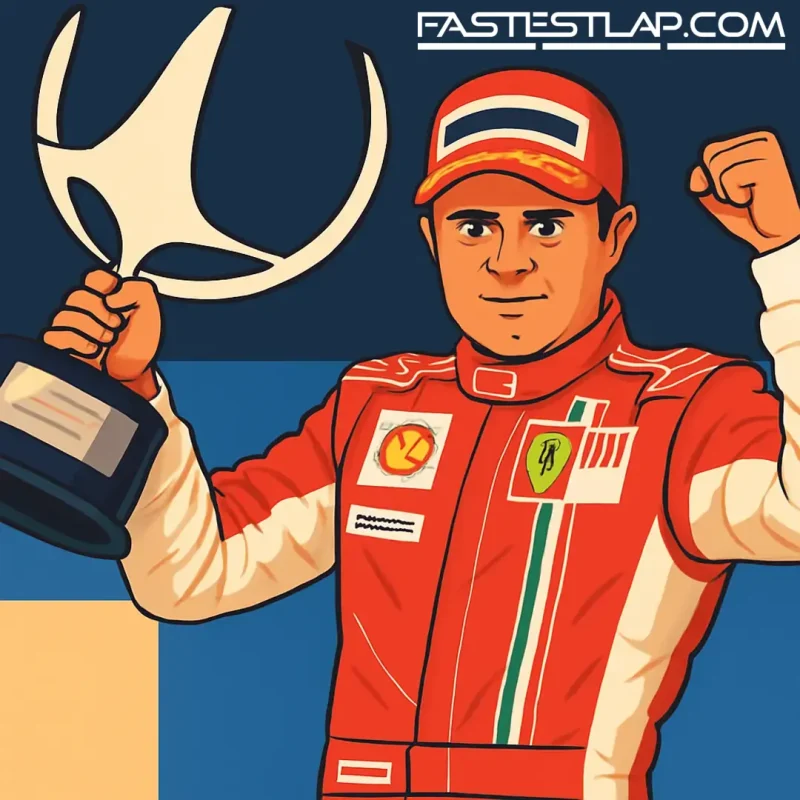Felipe Massa is going back to court over 2008 — not to prise a trophy away from Lewis Hamilton, but to put a dollar figure on what he believes was taken from him.
The Brazilian is seeking $82 million in damages tied to the fallout from the Singapore Grand Prix, the race that later became “Crashgate.” His case rests on a simple, stark claim: key powerbrokers knew enough, early enough, to act — and didn’t.
At the core is Bernie Ecclestone’s 2023 interview in which the former F1 supremo recalled being informed, during the ’08 season, that Nelson Piquet Jr. had deliberately crashed in Singapore to trigger a Safety Car and aid teammate Fernando Alonso. Ecclestone later said he couldn’t remember making those comments. Max Mosley, the FIA president at the time, died in 2021. That leaves Massa’s lawyers attempting to turn alleged private knowledge into public accountability.
The sporting side is thorny. F1’s regulations, ultimately governed by the FIA’s International Sporting Code, make one thing clear: once the championship is settled at the annual prize giving, results aren’t reopened. Hamilton is and remains the 2008 world champion. Massa’s route, therefore, isn’t to rewrite the standings but to seek compensation for what he argues was an avoidable injustice.
Could the 2008 Singapore result have been annulled at the time? In theory, yes — but only via a proper process. The FIA’s International Court of Appeal (ICA) has the authority to annul or amend a competition’s result. However, that power is typically unlocked by a competitor protest within the prescribed time limits. None was lodged in 2008, in part because few outside Renault truly understood what had happened until well after the season concluded.
A recent example underlines the nuance. In early 2024, the ICA published a decision from an International GT Open case involving a mismanaged Safety Car at the Red Bull Ring. The Spanish National Court of Appeal had attempted to cancel the race; the ICA clarified that only it could do that — and, crucially, weighed whether fixing one wrong would create greater unfairness elsewhere. That notion of “sporting fairness” is baked into the FIA rulebook. It’s why reaching back into an already-awarded world championship is seen as opening Pandora’s box: it would distort not just the drivers’ table but the teams’ outcome, prize money, contracts, incentives — the whole domino stack.
Which is why Massa’s team has narrowed on damages. Their argument runs that senior figures knew enough, in time, to initiate the kind of process that could have ring-fenced Singapore before the FIA gala — and that by not doing so, they denied him a fair fight for the title. To win, they’ll likely need to prove two things: that people with the requisite authority possessed actionable knowledge during the 2008 season, and that a viable path existed then to act on it.
Even then, there’s the unavoidable sporting objection: Singapore was one race out of 18. Massa lost points to pit-lane calamity and a rogue Safety Car in Marina Bay; Hamilton lost them elsewhere to reliability and incident. Any court looking to quantify harm would want to see, with convincing clarity, that this single manipulated event swung the war. That’s not impossible to argue — but it isn’t straightforward.
Crashgate itself remains one of the sport’s darkest chapters. Renault’s Flavio Briatore and Pat Symonds were originally banned by the FIA, penalties later overturned in a French court. Both men went on to return to senior roles in and around Formula 1 in subsequent years, a reminder of how time and legal process can reshape even the harshest sanctions.
Strip away the noise and Massa’s case asks a bigger question than “who’s the rightful 2008 champion?” It asks whether F1’s governance had — or should have — an emergency mechanism for extraordinary discovery. What happens when a race is compromised in a way no one can reasonably protest in time? The system’s answer, historically, has been finality: close the book at the gala and never look back. Massa is arguing that there should have been a way to keep that book open, just a little longer, when the stakes demanded it.
Hamilton, for his part, sits outside the blast radius. He won the title under the rules of the day, and nothing in this action threatens that status. This is about accountability at the top and the value of a lost opportunity at the bottom line.
Seventeen years on, the paddock’s moved on — new teams, new stars, new politics — but the questions Massa is pressing remain uncomfortable and relevant. If he wins, he won’t rewrite history. He’ll redefine responsibility. And in a sport that trades on credibility as much as speed, that might be the bigger result.




